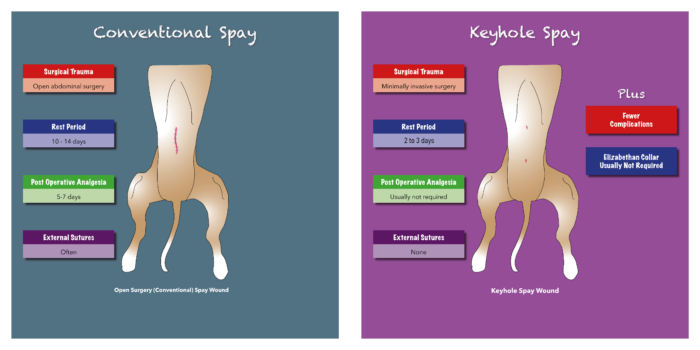Neutering
Neutering
The decision of whether to neuter your pet dog is often one that can cause some owners anxiety. In most cases there are compelling health as well as behavioural benefits that mean neutering is advisable. However, it is a decision that should be made on an individual basis so please feel free to talk to our vets and nurses about this topic.
Keyhole Surgery
We are now offering keyhole surgery for your pet! The most commonly performed surgery is the laparoscopic (keyhole) ovariectomy (removal of the ovaries)
In general, we advise allowing bitches to have their first season before neutering. This allows the urinary, genital systems and other systems to have matured.
We generally also advise castration for male dogs at between 10 and 12 months. If there are compelling reasons to operate before these times, both sexes can be neutered earlier but we would advise you consult our vets or nurses about this before booking in.
If the decision is made to neuter (spay – bitches, castrate – dogs) then your pet will receive the following care at our surgery:
Firstly, one of our vet nurses will admit your pet between 8:30am and 9:00am and will go over any health concerns with you. At this time you will be offered the opportunity to have a pre-operative blood test carried out on your pet that can help to rule out some rare but potentially serious internal problems that could affect the safety of anaesthesia. Then your pet will be weighed and taken to their kennel, where they will receive a premedication injection. This is usually a combination of a sedative drug with a potent painkiller, these premeds reduce the amount of anaesthetic we need to use and help to minimise post op pain. They also help to relax the animal thereby ensuring that they aren’t too stressed.
On administration of the initial anaesthetic (usually by injection into a catheter placed in a leg vein) your pet will also receive a further pain killing injection, and the operation will then be carried out.
The level of anaesthesia is constantly monitored both before the surgery starts (during clipping and preparation of the skin), during the surgery and throughout recovery. This is achieved by the vet / nurse checking and recording the heart rate, respiratory rate and circulation. Anaesthetics are monitored and recorded for all surgery.
Once the operation is complete your pet will be placed back in their kennel with comfy bedding and blankets to keep them warm and will be continually monitored by our nurses until they have recovered consciousness.
They are checked regularly throughout the rest of the day to ensure they are settled and comfortable. When ready they will be offered some light feeding and some water.
When they are ready to be discharged, normally late afternoon or early evening, a nurse or vet will speak to you about the aftercare of your pet, and explain how to administer the post-op pain relief. We usually supply buster collars to help prevent licking at the wound and the infections and damage that that can cause.
We will arrange a wound check 3-4 days post op and then another final check with stitch removal, if there are any external skin stitches, usually around 10 days post op.
What is Keyhole Surgery?
• Also known as lap spay/keyhole spay
• This is a minimally invasive surgical procedure performed on female dogs & cats to remove their ovaries
• It involves passing a camera & specialised instruments through small incisions in the body wall of the abdomen
What is the procedure involved?
• Due to the positioning of the instruments a large clip area is required on both sides of the abdomen to ensure the entire area is aseptic
• Usually there will be 2 small incisions 0.5-1.2cm (compared to 6-15cm for a traditional bitch spay)
• Camera (laparoscope) is passed through one incision & the specialised instruments through the other
• Cautery is use to remove the ovaries
• The small incisions are closed with absorbable suture material under the skin with glue to close the skin
• Surgical time will depend on the patient but usually around 1 hour
Why should I choose this over a traditional spay for my pet?
• Reduced post operative pain – less need for post operative pain relief
• Quicker post operative recovery– 3 days compared to 10 days in most cases
• Reduced risk of wound complications
• Smaller wounds
Ask a member of our team regarding the benefits of keyhole surgery!
